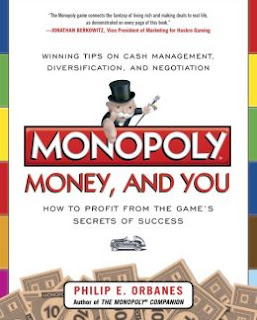by Philip Orbanes
Americans of my age all grew up with Monopoly, and we tend
to think we know the game quite well, especially if we usually won, like I did.
(My secret: I cheated.) So for a dose of familiar cultural icons used to
illustrate financial management, this book certainly has a good thing going.
Monopoly, Money and You is something between a game manual and a financial
guide, bringing together one of America’s best-loved family board games with
the day to day task of financial management. It is a fascinating study of
strategy, game theory, probability, and economic acumen that is enjoyable and
highly readable, thanks to parallelisms drawn between the popular game and real
life. By reading this book you will not, however, become a real estate mogul
and baron of American business by way of forming monopolies. Rather, you will
learn the strategy and secrets of winning at Monopoly, which may or may not be
applicable to better managing your finances.
I found some of the parallels drawn in the book were quite
tenuous. I don’t think the housing situation in the United states over the last
five to ten years can be summed up by saying it’s like Monopoly in that there
are a set number of houses and you can’t build what the bank can’t sell you.
(After all, wasn’t the real estate collapse due to loans on properties that
didn’t exist yet or weren’t priced accurately?) Still, money management is not
an intuitive process and an understanding of simplistic financial situations
like those that arise in Monopoly probably won’t hurt anyone’s money management
skills. I would argue that in a worst case scenario, Monopoly money management
skills are better than none. Likewise, people skills, as well as timing and
strategy play a big part of success in life, so Monopoly is actually not a bad
medium for gaining some insight into those areas. Whether or not they apply in
real life depends on a lot on the people involved and what’s at stake. Sure,
there isn’t much more at stake in Monopoly than bragging rights, so we can
expect real life approaches to be quite different, but the Monopoly angle still
has some value, I think.
Ultimately, this book is mostly a guide to winning Monopoly
as opposed to a guide to gaining control of your finances. It covers every
aspect of the game that must be understood to win consistently: probability,
timing, opportunity cost, money management, negotiation, psychology, game
theory in general, Monopoly theory in specific, and luck. There are several
walk-throughs of actual championship games, which although difficult to follow
at times, they are still somewhat exciting when you see the range of strategies
and secret tips from this book applied in actual games. This book is not going
to make you rich (unless you sweep a bunch of Monopoly tournaments), but it is
nonetheless a fun, out of the ordinary read, for a book on finances, and well
worth four and a half dollar marks.

